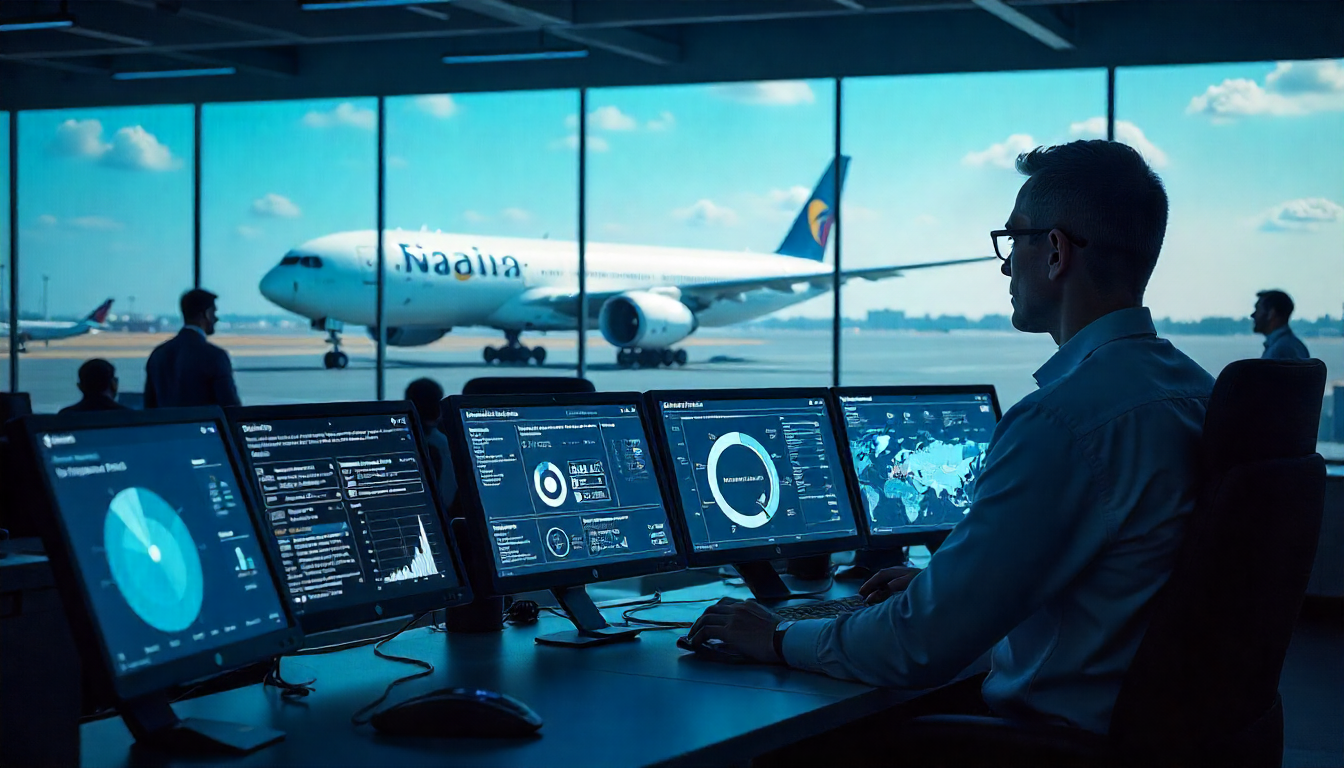7 Ways Generative AI Transforms Airline Operations and Boosts Profits in 2025

7 Ways Generative AI Transforms Airline Operations and Boosts Profits in 2025
Generative AI for airline operations delivers measurable results across customer service, efficiency, and revenue generation. The AI in aviation market projects explosive growth from $1.75 billion in 2025 to $4.86 billion by 2030, with a CAGR of 22.6%. Aircraft currently generate over 100 million terabytes of data annually, but most remains untapped.
Airlines report significant improvements when implementing AI strategically. Machine learning algorithms achieve 87% accuracy in predicting passenger satisfaction. Overall passenger satisfaction increased 6 points in 2025 from 2024, with AI-powered services contributing to these gains.
Table Of Content
Current State: AI Adoption Takes Flight
Aircraft data generation could exceed 100 million terabytes annually, creating unprecedented opportunities for optimization. Airlines generate massive datasets from every flight, but historically struggle to extract actionable insights.
Modern generative AI processes this data in real-time, identifying patterns humans miss. Airlines use these insights for predictive maintenance, route optimization, and personalized customer experiences.
Early adopters report measurable improvements in operational efficiency and customer satisfaction. The technology handles routine tasks while human staff focus on complex problem-solving.
Key AI Applications Currently in Use:
- Automated customer service chatbots
- Predictive maintenance scheduling
- Dynamic pricing optimization
- Real-time flight path adjustments
- Baggage handling automation
Advantage 1: Personalized Customer Experiences That Drive Loyalty
AI analyzes passenger data to create tailored experiences. Chatbots provide real-time flight updates, gate changes, and rebooking options without human intervention. Customer service benefits extend beyond basic information. AI predicts passenger needs based on travel history, preferences, and current circumstances.
Personalization Benefits:
- Instant response to customer queries
- Proactive service notifications
- Tailored travel recommendations
- Customized loyalty program offers
- Multi-language support capabilities
Airlines using AI personalization see higher customer satisfaction scores and improved loyalty program engagement.
Advantage 2: Operational Efficiency That Cuts Costs
Generative AI optimizes complex operational workflows. Ground handling, catering, refueling, and maintenance coordination improve through intelligent scheduling systems. AI algorithms coordinate multiple ground services simultaneously, reducing aircraft turnaround times. This efficiency translates directly to cost savings and improved on-time performance.
Operational Improvements:
- Automated crew scheduling and optimization
- Intelligent baggage handling and tracking
- Streamlined catering load planning
- Coordinated ground service scheduling
- Real-time resource allocation
| Traditional Operations | AI-Enhanced Operations |
|---|---|
| Manual scheduling | Automated optimization |
| Reactive maintenance | Predictive servicing |
| Fixed pricing | Dynamic adjustments |
| Basic customer service | Personalized interactions |
| Siloed data systems | Integrated analytics |
Advantage 3: Disruption Management That Saves Revenue
Flight disruptions cost airlines billions annually. AI minimizes these impacts through intelligent crew reassignment, aircraft rescheduling, and passenger rebooking. Machine learning algorithms process multiple variables simultaneously—crew availability, aircraft positioning, passenger connections, and weather patterns—to find optimal solutions.
Disruption Response Capabilities:
- Automated crew roster optimization
- Real-time aircraft repositioning
- Passenger rebooking prioritization
- Alternative route suggestions
- Impact cost calculations
Airlines report 20-30% reduction in disruption-related costs when AI manages these scenarios.
Advantage 4: Enhanced Loyalty Programs Through Smart Targeting
AI transforms loyalty programs from generic point systems to personalized engagement platforms. Predictive analytics identify which offers each customer will value most. 63% of elite loyalty members select booking channels based on AI capabilities, compared to 44% of non-members. This preference drives direct booking revenue and reduces distribution costs.
Loyalty Program Enhancements:
- Personalized offer targeting
- Predictive lifetime value scoring
- Behavior-based tier upgrades
- Dynamic reward pricing
- Cross-selling optimization
Advantage 5: Predictive Maintenance That Prevents Problems
Aircraft generate continuous streams of sensor data during flight. AI analyzes this information to predict component failures before they occur. Predictive maintenance reduces unplanned downtime by 30-50% while extending component lifespans. Airlines save millions in avoided cancellations and emergency repairs.
Maintenance Optimization Features:
- Component failure prediction
- Optimal maintenance scheduling
- Parts inventory management
- Technician skill matching
- Maintenance cost forecasting
The industry faces a projected shortage of 70,000 aircraft technicians by 2033. AI helps optimize existing workforce productivity to address this challenge.
Advantage 6: Flight Path and Fuel Optimization
AI analyzes weather patterns, air traffic, and aircraft performance to recommend optimal flight paths. Real-time adjustments during flight save fuel and reduce emissions. Fuel represents 20-30% of airline operating costs. AI-optimized routing can reduce fuel consumption by 3-8% per flight, generating substantial savings.
Route Optimization Benefits:
- Real-time weather route adjustments
- Traffic pattern optimization
- Fuel burn minimization
- Emission reduction tracking
- Arrival time precision
Airlines report fuel savings of $50,000-$200,000 annually per aircraft through AI optimization.
Advantage 7: Revenue Maximization Through Dynamic Pricing
AI analyzes booking patterns, competitor pricing, and external factors to optimize ticket prices in real-time. Dynamic pricing maximizes revenue while maintaining competitive positioning. Machine learning identifies optimal pricing for ancillary services—seat selection, baggage, Wi-Fi—based on individual passenger profiles and willingness to pay.
Revenue Management Features:
- Real-time price optimization
- Demand forecasting accuracy
- Competitor pricing analysis
- Ancillary revenue targeting
- Seasonal trend prediction
Airlines using AI revenue management report 2-8% increases in passenger revenue per mile.
Implementation Strategy: Getting Started with Airline AI
Phase 1: Foundation Building (Months 1-6)
- Implement basic customer service chatbots
- Deploy predictive maintenance for critical components
- Start collecting and organizing operational data
- Train staff on AI tool integration
Phase 2: Operational Integration (Months 7-18)
- Expand AI to crew scheduling and ground operations
- Launch dynamic pricing for ancillary services
- Implement disruption management systems
- Develop personalized loyalty program features
Phase 3: Advanced Optimization (Months 19-24)
- Deploy comprehensive revenue management AI
- Integrate all systems for holistic optimization
- Launch predictive analytics for strategic planning
- Measure and refine all AI applications
Tip
To enhance your eCommerce store’s performance with Magento, focus on optimizing site speed by utilizing Emmo themes and extensions. These tools are designed for efficiency, ensuring your website loads quickly and provides a smooth user experience. Start leveraging Emmo's powerful solutions today to boost customer satisfaction and drive sales!
ROI Analysis: AI Investment Returns for Airlines
| AI Application | Average ROI | Payback Period | Key Benefits |
|---|---|---|---|
| Customer Service Chatbots | 300% | 8-12 months | Reduced call center costs, 24/7 service |
| Predictive Maintenance | 250% | 12-18 months | Avoided cancellations, extended component life |
| Dynamic Pricing | 400% | 6-10 months | Increased revenue per passenger |
| Route Optimization | 200% | 10-14 months | Fuel savings, improved on-time performance |
| Disruption Management | 180% | 14-20 months | Reduced operational disruptions |
Challenges and Success Factors
Implementation Challenges:
- Data quality and integration complexity
- Staff training and change management
- Regulatory compliance requirements
- System integration with legacy infrastructure
- Initial investment and technology costs
Critical Success Factors:
- Start with high-impact, low-risk applications
- Ensure data quality before AI deployment
- Invest in comprehensive staff training
- Maintain human oversight for safety-critical decisions
- Regular performance monitoring and optimization
Data Security Considerations:
- Passenger data privacy protection
- Secure AI model deployment
- Compliance with aviation regulations
- Regular security audits and updates
- Incident response planning
Conclusion
The aviation industry projects continued AI investment growth. The global AI in aviation market will grow from $7.4 billion in 2025 to $27 billion by 2032, reflecting widespread adoption.
Airlines that master AI integration create sustainable competitive advantages. Better customer experiences, operational efficiency, and revenue optimization compound over time.
FAQs
How does generative AI personalize customer experiences in airlines?
AI analyzes passenger data to deliver tailored travel recommendations, loyalty program offers, and proactive service notifications. This creates a seamless, personalized journey that builds stronger customer loyalty.
Can AI really improve customer service efficiency?
Yes. Chatbots powered by AI handle real-time flight updates, rebooking, and gate changes without human intervention. Passengers benefit from instant responses, multi-language support, and proactive service alerts.
How does AI reduce airline operational costs?
AI optimizes crew scheduling, baggage handling, catering, and ground services. This cuts turnaround times, lowers operational expenses, and improves on-time performance across flights.
What role does AI play in baggage handling?
Generative AI improves baggage tracking accuracy and automates routing, ensuring fewer lost bags and faster delivery. This boosts passenger satisfaction and reduces compensation costs for airlines.
Can AI support real-time decision-making in airline operations?
Yes. AI enables real-time resource allocation for ground services, catering, and refueling. This ensures smoother coordination and reduces costly delays at busy airports.
How does AI impact airline loyalty programs?
By analyzing passenger history and preferences, AI helps airlines customize loyalty program rewards. Personalized offers increase engagement and boost long-term revenue through repeat travel.
What overall benefits can airlines expect from generative AI by 2025?
Airlines gain higher customer satisfaction, lower operational costs, improved on-time performance, and stronger loyalty program participation. Ultimately, generative AI drives both efficiency and profitability.









